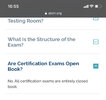D
deleted1088441
Given recent changes to USMLE and MOC, we need to look at the board certification exam too! Look at this interesting new viewpoint piece that argues for this!
It is a single high-stakes exam that could thwart the career you have been working towards for years. It costs thousands of dollars and hasn’t been proven as a marker of predicting a good clinician. Its failure rate is almost universally higher than USMLE exams, and things have only worsened during COVID.
Given the ongoing changes to USMLE and MOC, we need to look at the board certification exam too. Direct link to article here as well: https://rdcu.be/cdwTF
It is a single high-stakes exam that could thwart the career you have been working towards for years. It costs thousands of dollars and hasn’t been proven as a marker of predicting a good clinician. Its failure rate is almost universally higher than USMLE exams, and things have only worsened during COVID.
Given the ongoing changes to USMLE and MOC, we need to look at the board certification exam too. Direct link to article here as well: https://rdcu.be/cdwTF

